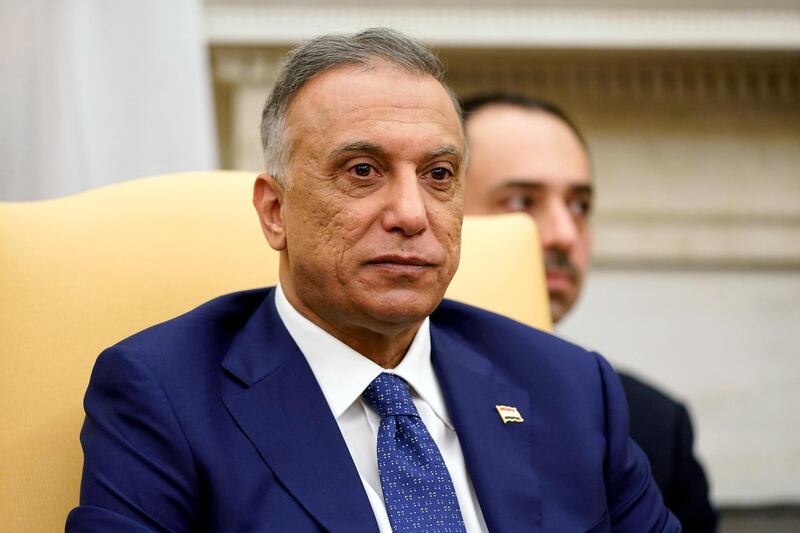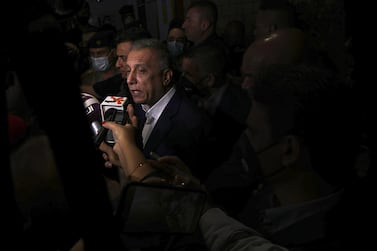US officials voiced cautious optimism on progress made with Iraq during the visit of Prime Minister Mustafa Al Kadhimi to Washington last week.
They said they expected follow-up meetings in the weeks and months ahead on political and economic advances made during Mr Al Kadhimi’s visit, the first by an Iraqi leader since 2017.
He was received by US President Donald Trump, Secretary of State Mike Pompeo and the Secretary of Defence, Mike Esper.
State Department principal deputy assistant secretary Joey Hood said the visit created a roadmap for co-operation between Baghdad and Washington.
During the visit, the US announced $204 million (Dh749.3m) in humanitarian aid to Iraq.
Five US energy companies signed $8 billion worth of deals with Iraq to shore up US investments and lessen Baghdad’s reliance on Iran in energy and electricity.
Mr Hood said there was discussion about the Iraqi government's responsibility to protect US troops it hosts in joint bases from armed militias.
“The prime minister was clear that he sees a continuing need for support from the coalition partners including the US," he said.
"We are invited guests in the country and Iraq has obligations under international law to protect us. It is exactly what we expect to see.”
Mr Hood said the assassinations of two activists in Basra in the past two weeks, and other attempts, were “completely abhorrent”.
Doctor and activist Reham Yacoub was gunned down in her car last Wednesday.
Yacoub's killing follows attacks this year on activists protesting against the Iran-backed militias and corruption in the country.
While the Iraqi government promised accountability for those crimes, no arrests have yet been made for Yacoub’s killing.
US deputy assistant secretary for Iraq, David Copley, told The National that discussions on security were comprehensive.
“The focus is on working together, building capacity, and the joint security relation is something to be proud of,” Mr Copley said.
He said the US was working towards a shift to advisory and training roles, and looked forward “to a day when we are no longer required".
But until that happens, “we stand until the mission is complete”, Mr Copley said.
He said there was a need for security reforms and disarming militias, whether the US troops stayed or left Iraq.
“The need for security reform is not related to US presence,” he said.
Mr Copley called for a return to the rule of law and said weapons should be back under the control of state institutions.
Mr Hook and Mr Copley said Baghdad and Ankara should talk about Turkey's air strikes in northern Iraq.
“There is no better place for the parties to start than Sinjar,” Mr Hood said.
He urged the governments of Iraq, Turkey and the Kurdish Region to work together to clear out the militias, including the Kurdistan Worker’s Party, from the area.
The US officials said it was up to Mr Pompeo to decide whether Iraq received another sanctions waiver to import electricity from Iran.
But Randa Slim, a director at the Middle East Institute, expected the US to grant the waiver.
“The trip paved the way for another US extension of sanctions waivers for Iraq to import gas and electricity from Iran, without which Mr Al Kadhimi’s woes at home will only get worse,” Ms Slim wrote on Monday.
“While the threshold for success [for the visit] was low, Mr Al Kadhimi’s first trip to Washington as prime minister delivered few notable tangibles."
She said those included the high-level meetings, security commitments and US investments in the country.








